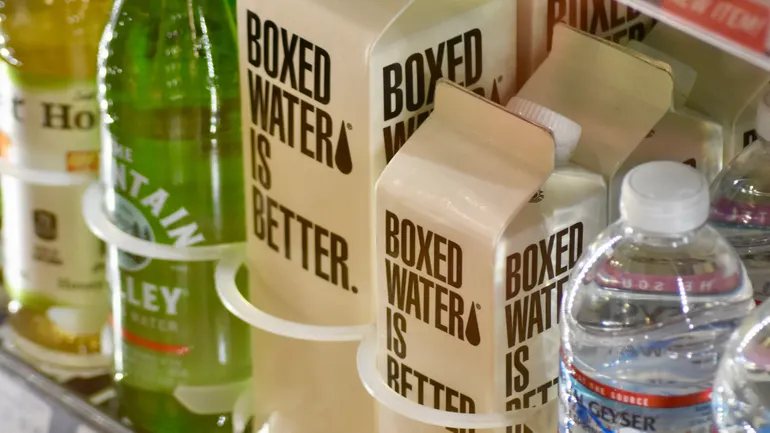Boxed Water is Better Agrees to Change Environmental Claims on Packaging
Dive Brief:
- The brand Boxed Water is Better, known for selling cartons of water, has agreed to modify certain environmental claims on its packaging following a decision by the BBB National Programs’ National Advertising Division in response to a case initiated by the International Bottled Water Association.
- NAD recommended that Boxed Water is Better clarifies or discontinues claims related to renewable materials and sustainable sourcing, while allowing claims regarding the cartons’ recyclability and general sustainability to remain.
- Boxed Water is Better CEO Daryn Kuipers stated, “We are very pleased that the NAD ruled that an overwhelming number of our claims are backed by science and reliably substantiated.”
Dive Insight:
Despite PET bottles dominating the non-carbonated water product market, with over 80% revenue share last year, there is a growing trend towards the use of metal- and fiber-based containers. Boxed Water is Better, along with other players like Just Water and Flow Beverage, offer water in cartons as an eco-friendly alternative.
Established in 2009, Boxed Water is Better has positioned itself as an environmentally conscious brand by promoting cartons as a sustainable packaging choice compared to plastic bottles. The company has supported its claims with a life cycle assessment, demonstrating the environmental benefits of its cartons over traditional plastic or aluminum packaging.
During NAD’s investigation into Boxed Water is Better’s advertising practices, the focus was on whether the company was engaging in deceptive advertising or exaggeration. The NAD concluded that the life cycle assessment does support certain environmental impact claims, such as “Boxed Water is better than aluminum.”
While many of Boxed Water is Better’s claims were found to be substantiated, the company agreed to adjust certain statements to provide clearer comparisons to premium plastic bottles. NAD recommended modifications to phrases like “Boxed Water is Better” and “Compared to single-use plastic bottles and canned water, our plant-based cartons have a lower environmental impact throughout their lifecycle.”
The International Bottled Water Association, which initiated the case, expressed satisfaction with Boxed Water is Better’s voluntary adjustments. However, the association has requested an appeal on some issues and will wait for the final decision before commenting further.
NAD allowed certain claims from Boxed Water is Better to remain unchanged, including the recyclability of the cartons, the number of trees planted by the company, and general environmental benefit and sustainability claims.
While the company made modifications to address NAD’s concerns, there were recommendations to clarify or eliminate statements related to renewable materials and biodegradability. Boxed Water is Better has agreed to make these changes to ensure transparency and accuracy in its environmental messaging.
Following NAD’s rulings, the International Bottled Water Association is appealing some decisions that were deemed acceptable. The association is seeking further review by the National Advertising Review Board to address any remaining concerns.
Legal experts at Kelley Drye have provided insights into the Boxed Water is Better case, highlighting the importance of accurate and substantiated environmental claims in the marketing of consumer products.
In a recent post, the issue of using mass balance accounting to substantiate environmental claims was tackled by experts. The discussion focused on a specific case where the total amount of renewable plastic purchased by a company accounted for 100% of its caps and liners, but the actual percentage of plant-based plastic in each product varied between 66% to 96%. This raised questions about how to accurately represent the environmental impact of the products.
The attorneys involved in the case referenced the Federal Trade Commission’s Green Guides, which provide guidelines for environmental marketing claims. While the Green Guides do not specifically address mass balance accounting, they do suggest that in certain circumstances, it may be permissible to claim a product has a certain amount of material even if any particular product does not physically contain that much. This ambiguity has led to calls for the FTC to update the Green Guides to provide clearer guidance on mass balance accounting.
Additionally, the U.S. EPA has raised concerns about promoting the mass balance approach, as it is not widely implemented or accepted worldwide. This further highlights the need for consistent standards and regulations in the field of environmental marketing claims.
The attorneys also discussed other marketing claims made by the company, such as the “better” claims. While specific comparative statements need to be substantiated, the use of the brand name “Boxed Water is Better” was deemed as puffery and did not require further substantiation.
As the case awaits a decision from the National Advertising Review Board (NARB) on the appeal, the attorneys emphasized the importance of ensuring that green claims are properly qualified and substantiated. With increasing scrutiny from competitors and potential legal challenges, companies need to be diligent in their environmental marketing practices.
In a related development, Boxed Water was recently acquired by Nyrad LLC, a group of private investors. This acquisition may bring new opportunities for the company to further enhance its sustainable packaging practices and strengthen its environmental commitments.
Overall, the discussion on mass balance accounting and environmental marketing claims serves as a reminder for companies to critically evaluate their green claims and ensure they are in compliance with regulations and industry standards. By maintaining transparency and accuracy in their environmental messaging, companies can build trust with consumers and demonstrate their commitment to sustainability.


